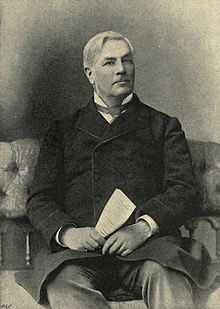Edward Gibson, 1st Baron Ashbourne
|
The Right Honourable The Lord Ashbourne PC QC |
|
|---|---|

Lord Ashbourne, by Dickinson.
|
|
| Lord Chancellor of Ireland | |
|
In office 1885–1886 |
|
| Monarch | Victoria |
| Preceded by | John Naish |
| Succeeded by | John Naish |
|
In office 1886–1892 |
|
| Monarch | Victoria |
| Preceded by | John Naish |
| Succeeded by | Samuel Walker |
|
In office 1895–1905 |
|
| Monarch | Victoria Edward VII |
| Preceded by | Samuel Walker |
| Succeeded by | Samuel Walker |
| Attorney-General for Ireland | |
|
In office 1877–1880 |
|
| Monarch | Victoria |
| Preceded by | George Augustus Chichester May |
| Succeeded by | Hugh Law |
|
Member of Parliament for Dublin University alongside David Robert Plunket |
|
|
In office 1875–1885 |
|
| Preceded by | John Thomas Bell |
| Succeeded by | Hugh Holmes |
| Personal details | |
| Born | 4 September 1837 |
| Died | 22 May 1913 |
| Alma mater | Trinity College, Dublin |
Edward Gibson, 1st Baron Ashbourne PC, QC (4 September 1837 – 22 May 1913) was an Irish lawyer and Lord Chancellor of Ireland.
Born at 22 Merrion Square, Dublin, Gibson was the son of William Gibson (1808-1872) J.P., of Rockforest, County Tipperary and Merrion Square, Dublin, by his first wife, Louisa, daughter of Joseph Grant, barrister of Dublin. He was the elder brother of John George Gibson, also a distinguished lawyer and judge of the High Court. He was educated at Trinity College, Dublin, graduating BA in 1858, winning the gold medal in History, English Literature and Political Science. He was also an Auditor and a Gold Medallist of the College Historical Society, and became its president in 1883.
Having been called to the Irish bar in 1860, Gibson was made an Irish Queen's Counsel in 1872 and three years later was elected Conservative Member of Parliament for Dublin University after unsuccessfully contesting for Waterford. Enjoying the patronage of Benjamin Disraeli, Sir Stafford Northcote and Lord Randolph Churchill, he was appointed Attorney-General for Ireland in 1877, before being admitted to the Irish Privy Council, and then appointed Lord Chancellor of Ireland in 1885, becoming a British Privy Counsellor that same year.
...
Wikipedia
